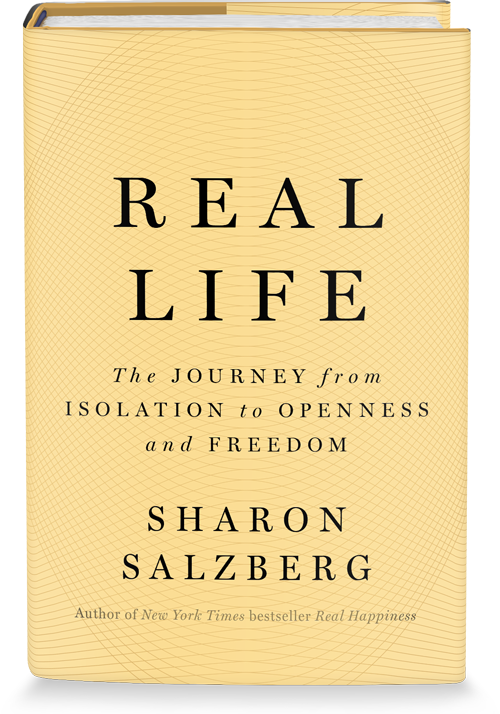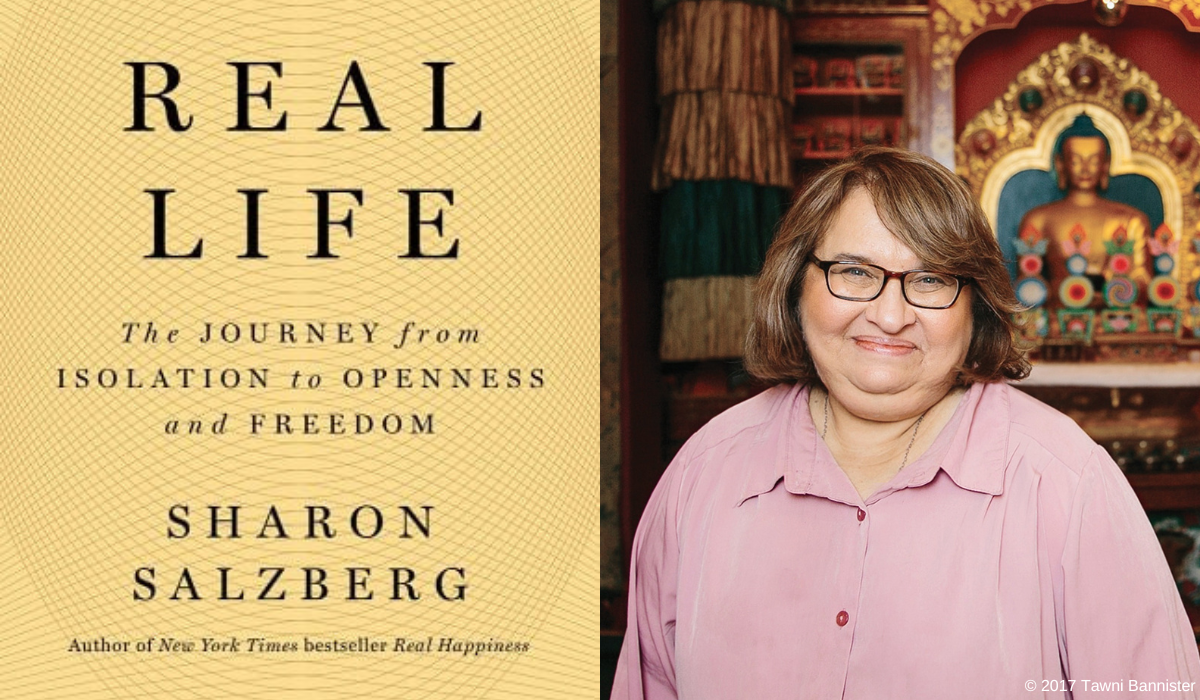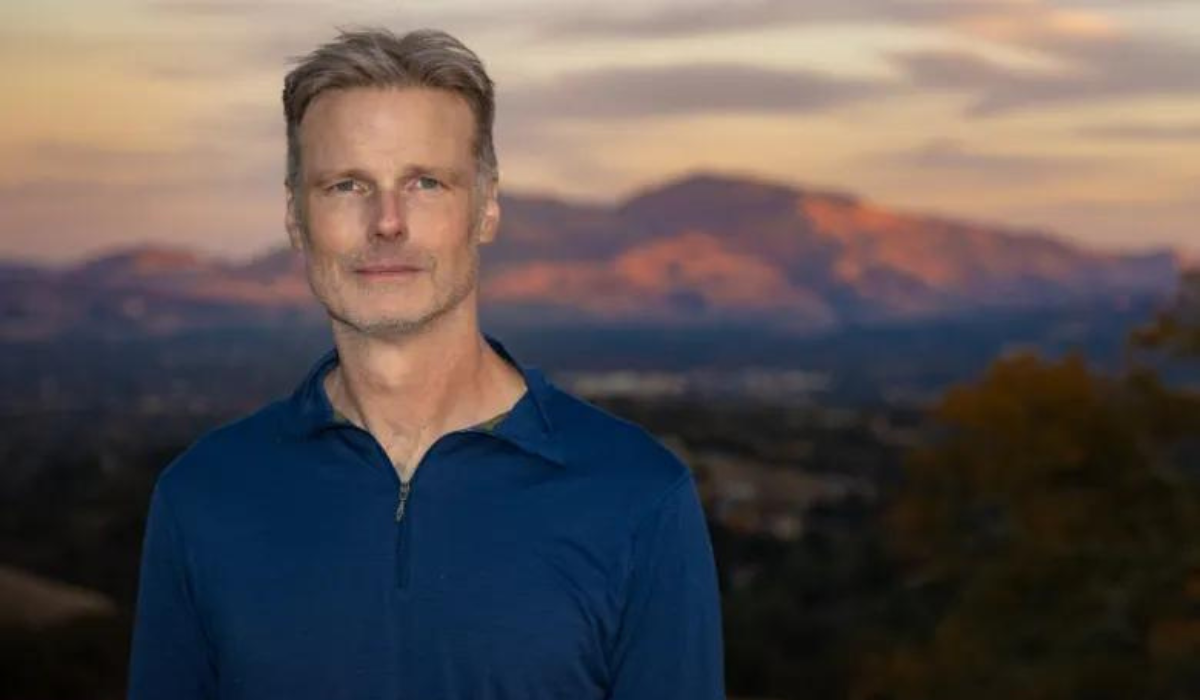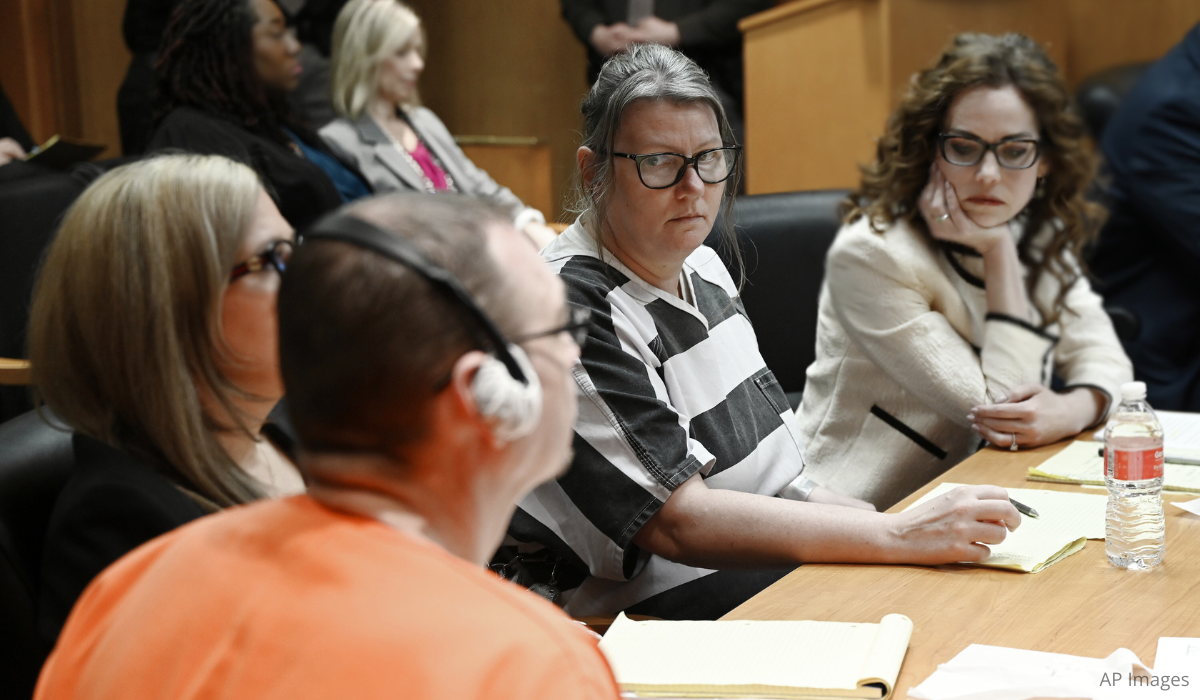"No Matter Our Circumstances, We Can Be Happier." Bestselling Author and Buddhist Teacher Sharon Salzberg on How We Can Find Deeper Joy, Even in Hard Times
In life, the simple act of being can be difficult. We get caught up in our spinning minds, scared in the face of challenge, and disconnected from who we truly are. Sharon Salzberg says it best: “It’s often hard to be a human being and to figure out how to do it well.”
Salzberg, a world-renowned author and meditation expert revered for her modern approach to Buddhist teachings, aims to show us what “well” means in her new book Real Life: The Journey from Isolation to Openness and Freedom. There is no prerequisite to do this work. Salzberg wants us to see that no matter what, we’re capable of expansiveness. We can live fully and freely.
“In my teaching and writing, I really want people to believe that kind of journey is possible for them—whoever they are, whatever they’ve got going on,” she tells The Sunday Paper. “This is real. It’s not fanciful. No matter our circumstances, we can be happier.”
A CONVERSATION WITH SHARON SALZBERG
Let’s walk through the title of your new book, Real Life. What do you mean by “real life”?
I mean an authentic life; when we fully engage with our everyday lives.
If I was going to describe myself at the age of 18, before I went to India and learned how to meditate, in one word I would've said ‘fragmented.’ My growth and my process have been to weave myself together and have a sense of wholeness or integrity—whether I'm alone or with others, whether I'm speaking in front of a group or I’m quietly reading. Whatever is happening, in beautiful times and in challenging times, it’s been about having that sense of that thread of: This is who I am. This is what I care about. These are the values that guide me. I’m not always perfect, by any means. I can’t always express them totally. But it’s like I don’t know who I am.
And I think we grow to that from the process of allowing ourselves to look within, however we do it, whatever that process of introspection we might choose, we discover quite a lot.
Looking within and finding expansiveness is a theme in your new book. You share a beautiful story about a young man whom you and your colleague met. This man confided that he’d never left his hometown of Houston and always dreamed of going to Wyoming to find openness and freedom…
I love that story. This young man was working behind the counter in a restaurant. He brought it up that he'd never left Houston and that he’d dreamed of going to Wyoming, so it was meaningful for him. After he said that, my colleague Joseph said to him, ‘There's an inner Wyoming, too.’
There’s another story I love about when Bruce Springsteen first heard Bob Dylan's music. [Springsteen] said he was about 15 years old, riding in the car with his mother when a Bob Dylan song came over the radio. He said it was like a giant boot ‘kicked open the door’ of his mind.
Sometimes things just open. We don't know what's out there, but we know it's bigger than we had believed before.
You cover the journey of constriction to expansion. Why is expansion important in living a real life?
When I talk about constriction or constraint, I see it as a state of feeling trapped, when we don't sense that we have options. When we feel like we are shut down. It’s almost as if we’re closed down in a room and we don’t know there's a door. An example is when we’re overcome with fear. We don't think, if it doesn't work out this way, maybe it'll work out that way. That's not what we think. Our options are shut. That's what I mean by that constricted state.
Expansiveness is seeing options. It’s being able to breathe freely. It’s realizing I don't have to be defined by my circumstance. I think of the stress dynamic, which really is a dynamic. There's the pressure or the situation or the circumstance, and then there's the resource with which it's met. For example, if you didn't sleep last night and you're in a cafeteria at work and somebody makes some comment, it's jarring. Whereas if you felt rested and at peace and you are on your way to a wonderful evening with friends, and you hear that same comment, you may think oh they’re having a bad day. It doesn't enter in the same way. This [expansiveness] means that we don't have to feel like we're coming from such a place of deficit or overwhelm. So we cultivate inner resources and a sense of community because both things will give us the ability to be resilient.
What if someone were to say that choosing expansiveness sounds great but it’s too much or too hard? What would you say?
I would say it’s all an experiment. And if you want to do the experiment, then the important thing is to keep staying aware and to know it’s about small things and not trying to take on everything at once. So this could mean making a resolve like you’re going to thank people today. It’s a small act. But then it’s important to stay aware and pay attention. What does it feel like? Does it make you feel weird? Crummy? Good? Because that's the best barometer: How does it all make you feel? Not what you've been told it's going to feel like, but how does it feel for you? What is the truth?
Also, when we’re facing difficulty and we feel a real challenge, we’re only going to be able to relate to it moment by moment. We tend to compound things. We try to deal with it all at once. But it’s important to remember to breathe in that moment. To be kind to yourself in that moment. Then you go to the next moment and the next moment.
You say there are many models of journeying to a free and real life. What are some other suggestions as to where we can start?
Meditating could be a vehicle to start experimenting with. My friend Amisha Jha, a neuroscientist, says that just 12 minutes a day will bring benefits. If you're thinking I've got to give up my life and meditate for like 18 hours a day, it’s not so. So that could be a start.
There are many different reflections we can use. One is the practice of lovingkindness. This is realizing that all our lives are connected—and this is different from liking people. One of the bases of lovingkindness is the belief that everybody wants to be happy. It’s seeing that we wish for people to come out of suffering and get to a happier place for the sake of everybody. We all want happiness; a sense of having a home somewhere in ourselves with one another. But we are so lost most of the time. We feel like numbness is happiness or disconnection is happiness or endless accumulation is happiness or revenge is happiness. We believe so many things and people live their lives that way. So that notion that everyone wants to be happy may appeal to you. People have told me that they practice lovingkindness in Zooms. They look at one face after another and they think, silently, you want to be happy, and you want to be happy, and you want to be happy too. And you can say, silently, may you have a good day, may you be happy, and may you be happy. This lovingkindness exercise is peaceful.
Another reflection could mean taking a minute—just one minute—before a major meeting or phone call to ask yourself: What do I want to see come out of this more than anything? Do I want to be seen as right or do I want a resolution? It could mean checking on your intention.
You write, “just as light permeates the sky, the true nature of our minds is permeated by the light of awareness.” Will you talk about this?
I try to offer both sides in the book: how to deal more skillfully with some of the painful states we fall into, like shame and fear, and remembering to take in the joy because there is light and there is joy. We can get so busy that we don't notice it. Or we can get to feeling so undeserving like, I can't let myself enjoy this. Look at how much pain there is. So in both cases, we are served by the power of our awareness.
In terms of the difficult states that may arise, many of us respond in a way by not trusting that our awareness can say, ‘Hang in there with the fear or hang in there with the sorrow or the shame and see it through.’ But when we do trust our awareness, we can learn something from the difficulty and not get caught in it. Our awareness is very, very powerful. It’s about knowing that there are options. There are choices. It's not that feeling what I'm feeling is bad or wrong, but it's not necessary to pursue it anymore because now there's this other force, which is understanding and wisdom and perspective. So awareness can go there to all those difficult places.
Also, we can relax when things are great. We can see that it’s awesome and beautiful and we don't have to be in such a hurry. We can relax and be open and take it in because it will nurture us so when things are ordinary, boring and routine, we can still have that sense of aliveness, and when things are hard, we don't feel so utterly depleted. Awareness is everything.

Sharon Salzberg is a meditation pioneer, world-renowned teacher, and bestselling author. She is one of the first to bring mindfulness and lovingkindness meditation to mainstream American culture over 45 years ago. Sharon is co-founder of The Insight Meditation Society in Barre, MA, and the author of 12 books, including her seminal work, Lovingkindness. Her new book is Real Life: The Journey from Isolation to Openness and Freedom, which you can order here. Her podcast, The Metta Hour, has amassed six million downloads. Learn more at sharonsalzberg.com.




